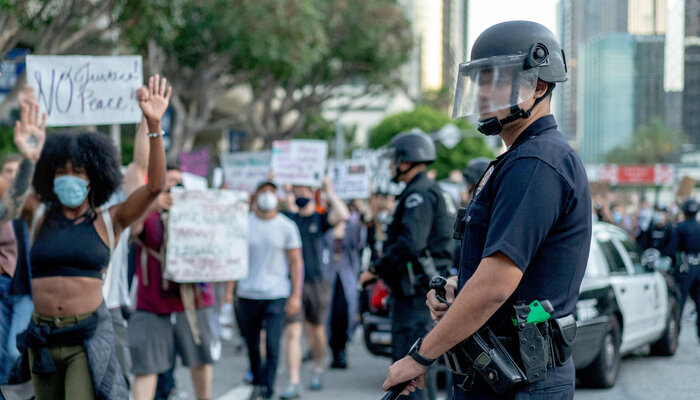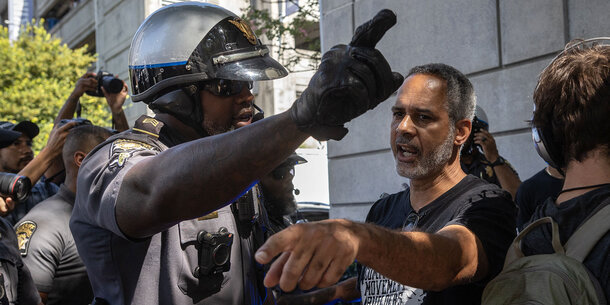Back in May, I flew to California to talk to a community organizing group about the Los Angeles Police Department’s use of social media monitoring tools. The Stop LAPD Spying Coalition invited me because the Brennan Center had obtained over 10,000 pages of documents about the LAPD’s use of social media — and with them, an unprecedented window into the department’s surveillance of activists and communities of color. The event was held at the Robinson S.P.A.C.E, a community-run outfit that provides free space for progressive local organizations in Los Angeles.
The event couldn’t have been more ordinary from a bystander’s perspective. It was the coalition’s weekly Tuesday night community meeting, with a little extra energy in the room because it was the first in-person meeting since Covid-19 began in March 2020. People listened and asked questions as I and several other panelists, including a Guardian journalist who coauthored powerful pieces explaining and contextualizing the documents we received, discussed the LAPD’s misuse of social media monitoring tools. Afterward, we had tacos.
Yet in late August, one of the cofounders of the Robinson S.P.A.C.E., Robin Petering, discovered something interesting after filing a Public Records Act request for any LAPD emails mentioning the event location: a company that apparently monitors social media and provides alerts to the LAPD had taken note of our little constitutionally protected gathering and issued an alert . . . about this.

It’s easy to laugh something like this off since it’s so absurd, but it’s a little harder when you take a close look at the alert — however contradictory and foolish it is.

We weren’t “protesters” — though I’ve been proud to be a protester in the past — but people exercising our constitutional rights inside a community space. We didn’t “plan to hold a demonstration.” We had a community meeting. There was no chance that any “assets” — a.k.a. LA police stations — would be “impacted.” And how could “associated disruptions . . . occur” in the area as the result of a PowerPoint presentation? But this line takes the cake: “Stop LAPD Spying Coalition has organized the demonstration to protest alleged LAPD social media surveillance” (emphasis added).
There are many alarming things about this “alert” outside of the analyst’s misunderstanding of what “alleged” means.
There’s no reason Stop LAPD Spying Coalition’s social media feed should have been surveilled, and certainly not on behalf of a law enforcement agency. There’s no reason an alert should have been issued. But what’s truly scary is the tone of this alert.
It makes it seem like what we were doing was wrong. It makes it seem like there was the possibility that police would have to respond to Robinson S.P.A.C.E. to handle “disruptions,” possibly putting any responding officer into an aggressive mindset. Worst of all, it makes it seem like we were potential criminals — all because we had the temerity to criticize the LAPD.
This isn’t the first time. The LAPD has a history of monitoring the Twitter posts of its critics and collecting the social media information of every person they stop and interview on the street regardless of whether they’re even suspected of a crime. And there’s no indication of whether or for how long these alerts get saved, but if they’re retained for even a day — and they were clearly retained for longer than that since the LAPD was able to produce them for Petering — they effectively rewrite the official history, obscuring the truth in favor of a narrative that this gathering of concerned community members somehow posed a threat.
The incident was revealing in at least two other ways, however. First, the vendor that produced the alert, NC4, did not appear in the thousands of pages of documents the Brennan Center received from our initial public records request. This raises questions about whether the LAPD fully disclosed the tools it has used for social media monitoring. Stop LAPD Spying has already filed a public records request to learn more about this tool and the scope of the LAPD’s surveillance.
Second, the documents that Petering received include two days’ worth of “special events and situational awareness” updates produced by the LAPD’s communications shop and forwarded to multiple divisions within the police department. These reports reveal the LAPD’s priorities for allocating its personnel and time. In addition to sporting events and a few municipal meetings, the reports flag a number of union actions and social justice–related events: our community event, a Tupac Shakur exhibit at L.A. Live, an event about a divestment pressure campaign on the University of California, and a Black Lives Matter event honoring “Mamas of the Movement.” (The full results of the request are here, and you can jump to page 100 to scroll through the relevant documents.)
These revelations highlight once again the importance of public oversight and strict limitations on law enforcement use of social media, which is far too easy to misuse. Social media is a powerful tool of speech, expression, and association. There must be strong guidelines and protections so police don’t abuse their power and target people for their race, religion, or political beliefs — including the very people who are critical of the police.






